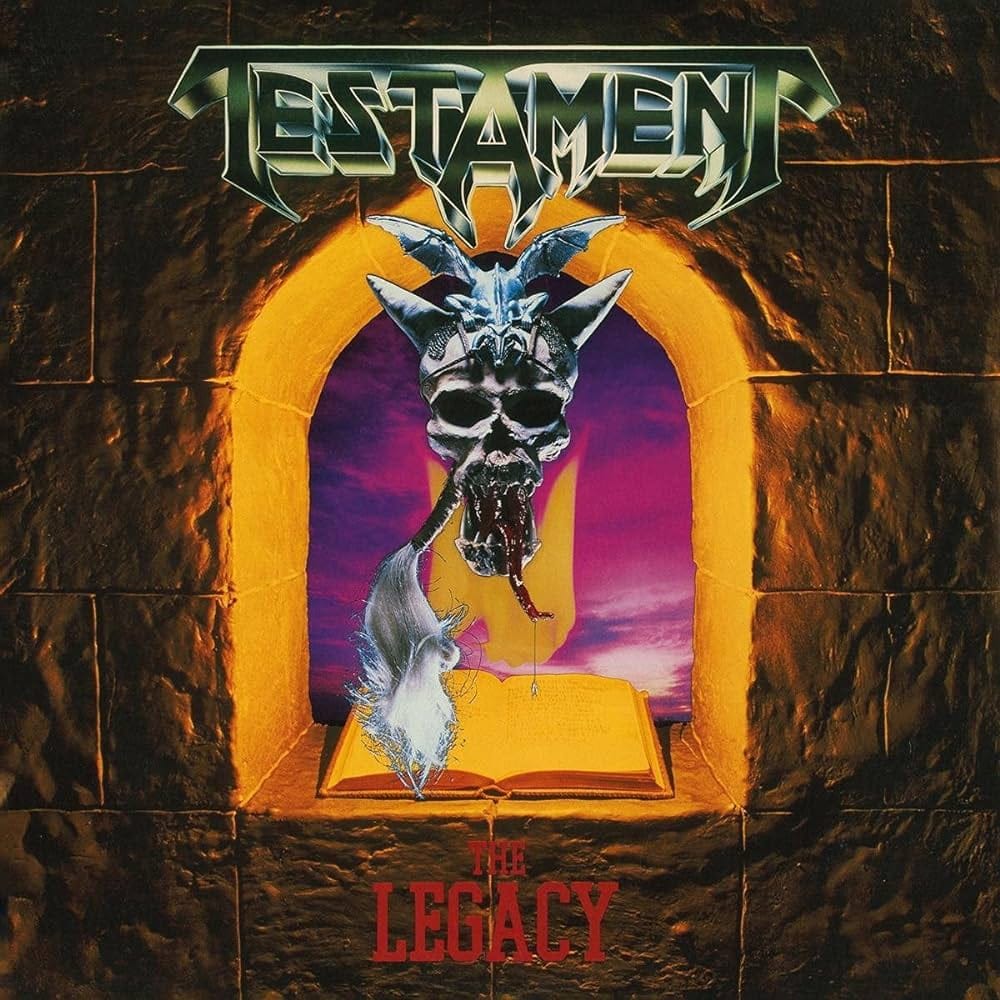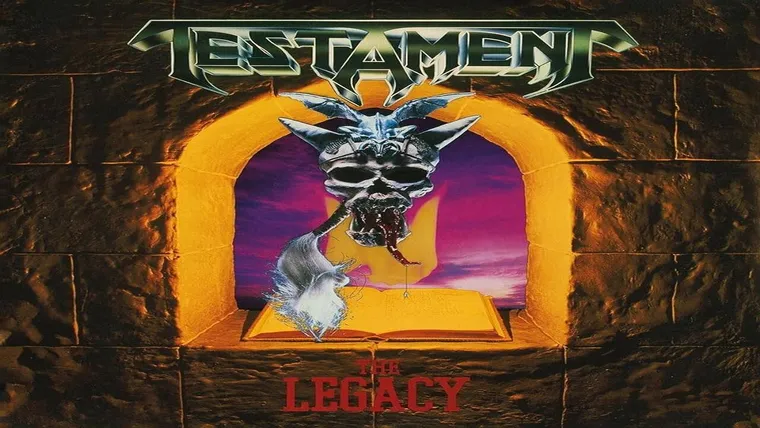
Released on April 21, 1987, The Legacy marked a pivotal arrival in the thrash metal landscape—an explosive debut that showcased both technical precision and songwriting maturity beyond the band’s years.
Having evolved from the Bay Area band Legacy, Testament introduced themselves to the world with a record that was aggressive, melodic, and darkly atmospheric. With the addition of vocalist Chuck Billy—replacing Steve “Zetro” Souza just before recording—the group found their definitive voice, while guitar prodigy Alex Skolnick began cementing his reputation as one of thrash’s most expressive and skilled soloists.
In a scene brimming with competition, The Legacy offered a statement of intent: Testament was not just another thrash band riding the coattails of Metallica or Slayer—they had their own sound, shaped by neoclassical guitar work, occult-inspired lyrics, and relentless riffage that blended finesse with fury.
A Debut with Definition: Tradition Meets Technicality
With The Legacy, Testament didn’t attempt to break thrash metal’s rules—they elevated them. From the moment “Over the Wall” erupts into its pummeling main riff and Billy’s thunderous vocals cut through, it’s clear this isn’t amateur hour. The band honed their style on Bay Area stages, and it shows: this is thrash built for the pit but executed with surgical control.
Tracks like “Burnt Offerings” and “The Haunting” embody the band’s early identity—dark, intense, and riff-centric with hints of the supernatural. Skolnick’s leads don’t just shred—they sing, offering melodic counterpoints that lift the arrangements beyond sheer aggression. Meanwhile, Eric Peterson and Greg Christian provide a rhythm section that’s tight and razor-sharp, ensuring the complex compositions never lose their impact.
Even amid the genre’s ferocity, Testament stood apart for their clarity. While many debut albums in thrash were murky or rough around the edges, The Legacy was tight and controlled, with every note precisely placed.
In a 1988 interview, Billy reflected on the band’s early ambition:
“We weren’t just trying to be fast—we wanted people to hear the songs and remember them. We wanted melody and darkness, not just speed for speed’s sake.”
Controlled Chaos: Musicianship on Display
Produced by Alex Perialas—known for his work with Anthrax and Overkill—the album strikes a strong balance between raw energy and studio polish. The guitars are sharp and biting but still full-bodied. Drummer Louie Clemente, often underappreciated in retrospect, plays with precision and groove, giving songs like “Apocalyptic City” a dynamic edge that propels rather than just punishes.
Skolnick, still a teenager at the time of recording, delivers one of thrash’s most impressive guitar performances. His solos on “First Strike Is Deadly” and “Raging Waters” elevate the album from great to genre-defining. You can hear the classical influence, but it never comes off as self-indulgent—it’s pure metal craftsmanship.
In retrospect, it’s astonishing how confident The Legacy sounds. This isn’t a band testing the waters; it’s a band cannonballing into the deep end and making waves on the way down.
Darkness and Drama: Thematic Undertones
Lyrically, The Legacy leans into occult themes, apocalyptic visions, and death—but it never feels like posturing. There’s a theatrical element to songs like “Do or Die” and “Curse of the Legions of Death,” but it’s delivered with conviction. Billy’s powerful delivery brings menace and drama to every word.
Testament wasn’t singing about war or politics like many of their peers—instead, they tapped into a darker mythos, drawing on horror tropes and ancient mysticism. This gave their material a unique flair, one that would continue to evolve across future albums.
Speaking about the inspiration behind the themes, Peterson later noted:
“We were into horror movies, mythology, and darker stuff. It wasn’t about being evil—it was about telling stories. We liked that the lyrics could be visual, almost cinematic.”
Consistency Through Chaos
As debuts go, The Legacy is remarkably consistent. Clocking in at just under 39 minutes, the album never overstays its welcome. Every track earns its place, and there’s a cohesiveness to the sequencing that makes it feel more like a full-fledged statement than a collection of demos and ideas. From the urgent pace of “Over the Wall” to the slow-burning menace of “Apocalyptic City,” the album keeps its momentum while allowing for dynamic shifts.
Testament didn’t reinvent thrash, but they refined it—infusing it with technical skill, melodic sensibility, and thematic depth. In a genre that often prided itself on chaos, The Legacy brought a sense of structure without sacrificing intensity.
Final Verdict: 8.5/10
Standout Tracks:
- Over the Wall
- The Haunting
- Burnt Offerings
- First Strike Is Deadly
- Apocalyptic City
The Legacy is one of thrash metal’s strongest debut records—fierce, focused, and fueled by a young band with something to prove. Testament arrived not just as contenders in a crowded scene but as a band with a clear vision and the chops to back it up. Over three decades later, its riffs still cut deep, and its legacy (no pun intended) remains firmly intact.
If you're a fan of technical thrash with atmosphere and bite, this is where the Testament story begins—and it's a hell of an opening chapter.
Until next time, play it loud, friends!

